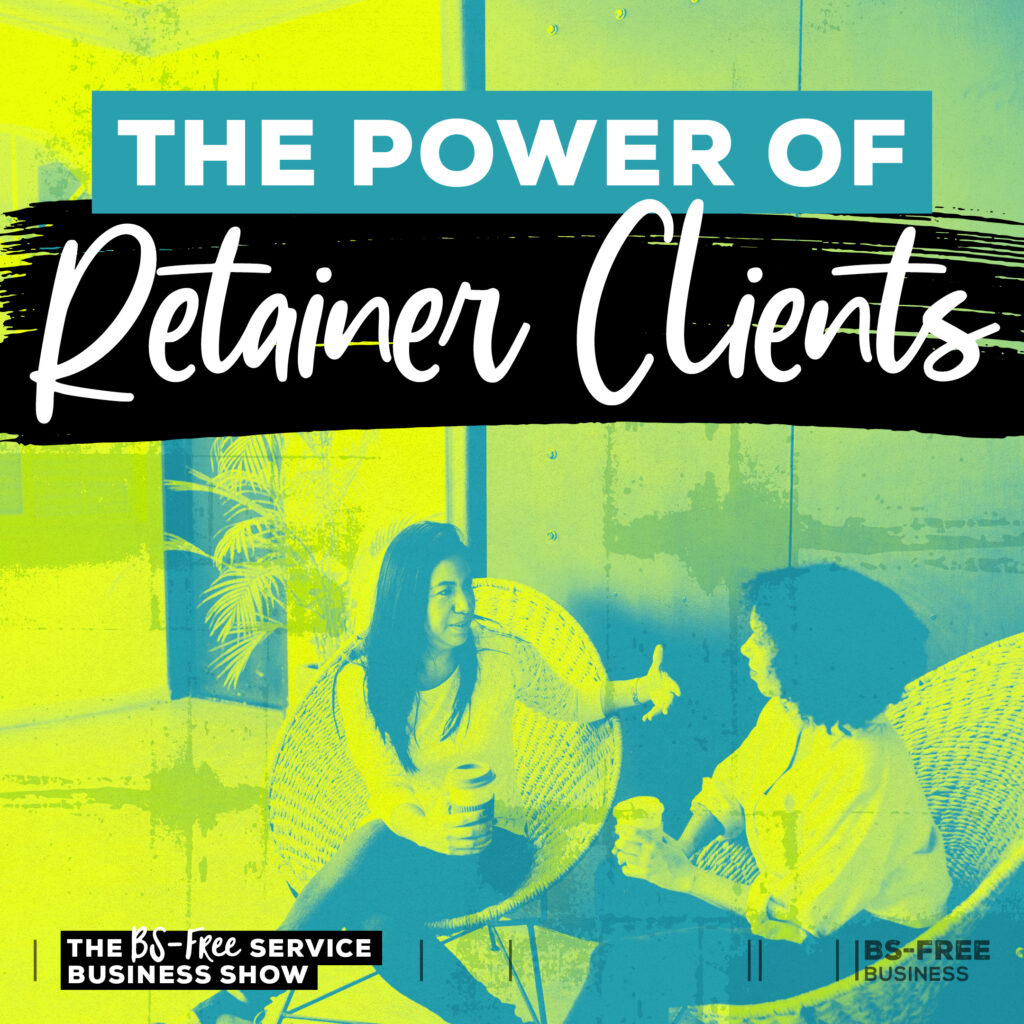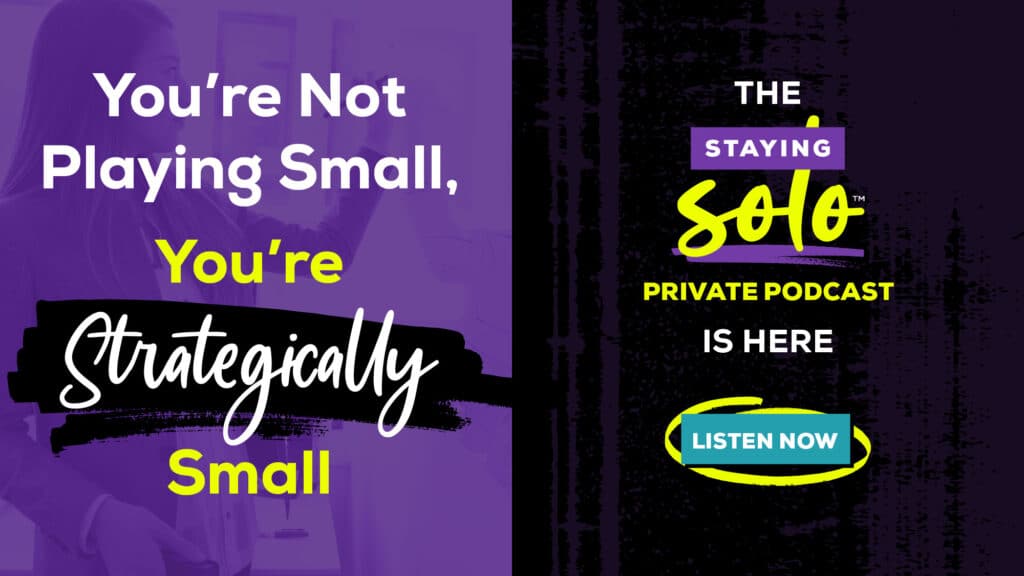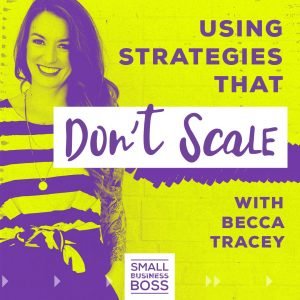
Search the site:
The Power of Retainer Clients
If there’s one tried and true way of delivering services to clients, it’s the retainer model. While it’s often overlooked for project engagements or VIP days, a retainer with the proper structure can be incredibly powerful. In this episode, we’re exploring everything you need to know about retainer clients.
Picking up where we left last week off talking about VIP days, I want to talk about retainers and how they can be used to deliver your services.
Retainers are probably the delivery model I’ve used the most in my many years as a service provider, but I want to remind you that my goal with these two episodes is to provide you with a balanced look at your options.
In a market full of hyped-up solutions that pit one model against the other to make the sale, it’s easy to get sucked into thinking there’s only one right way.
I’m all about cutting the BS, so I want you to know there’s no one right way to deliver your services or even run your business. No matter what may be trendy at the moment or what all of your friends may be doing, you get to choose.
With that, let’s dive into what you need to know about retainers to decide if they’re suitable for your business.
What is a Retainer?
The idea of a retainer is simple. A client pays you a set amount per month for a set amount of hours or deliverables.
They commit to working with you for multiple months, and you hold time in your schedule for them.
I find retainers super appealing as I like to have predictable work and get into a rhythm with clients. Building relationships with clients and being invested in our work is important to me, and I’ve found that retainers are the best way to do that. When I was doing more project work, I found it harder to navigate the relationship and to feel connected to the work being done.
Perhaps we can chalk this up to my liking to be comfortable with clients, and this is the predominant way I’ve always worked with clients.
The Promise of Retainer Clients
In researching this episode, I wasn’t able to find many people talking about retainers. I’m not sure if that’s because no one figured out how to package it up in a flashy way or if there’s an assumption that everyone already knows how to structure them.
Either way, we will talk about them today as they’re a powerhouse for service business owners and can help you break out of the up/down cycle of having to find and sign new clients. Retainer clients are typically with you for months or years, meaning you have consistent monthly revenue.
Case in point, one of my past clients was with me for eight years, and our average client retainer lasts between two and three years. This makes things like budgeting and revenue forecasting much more predictable for me as a business owner. (That said, I am very aware that people can leave anytime, but they tend to stick around for a while.)
Aside from recurring monthly revenue, the most significant upside of retainers is that you don’t need to do nearly as much marketing as you do with project work or VIP days. So if you’re someone who just wants to do your work and not marketing/sales, retainers are likely the best fit for you.
I’ll talk more about the pros (and cons) shortly, but those are the two big selling points for retainers as a way to deliver services for clients.
What Works for Retainers
Retainers work for nearly every type of service business as long as the client has an ongoing need for the type of work you do.
One thing I recommend before you dive into a long-term retainer with a client is that you do a project together before you commit. That enables you to ensure it’s a solid mutual fit.
For agency clients, if we’re looking at providing ongoing content and support, we typically start with a strategy project. That ensures they have a clear plan for us to execute month-over-month against. If they’ve got a strategy in place and simply want case studies or blog posts, we do a test project together before we move into a retainer. That’s our insurance policy to make sure we’re going to like working together, as there’s nothing worse than a long-term retainer client that you don’t like working with.
If you’re wondering what you could offer on a retainer basis:
For coaching, you could have a six-month coaching agreement that’s essentially a retainer with your client with set calls or access to you.
For consulting, you may have an agreement to be available X hours per month on an as-needed basis.
For creatives, you can have a retainer with set deliverables or hours available for assignments in a month.
Keep in mind that there are a lot of different options available to you for structuring a retainer. It can be based on hours or deliverables based on how you best work.
If you can set deliverables for a flat rate, that’s a great option, as it makes the scope of work very clear. However, sometimes you’ll be best served by having a block of hours in a given month to use as agreed upon with the client.
If you’re offering retainers, I highly recommend you avoid getting into a situation where you constantly have to talk with a client about a new contract. I personally like to have a 12-month contract with a 30-day termination that either party can execute.
You can also consider going on a rolling basis with clients once that know-like-trust factor is in place. This is how we currently work with a couple of our clients, and it’s agreed upon that we’re invested in this continuing for months and years to come.
What Do You Need to Offer Retainers?
If you’ve never offered a retainer, you’re probably trying to figure out what you need to make it work. And if you already do, you likely have a few ideas to make your retainers more effective.
Like any other offer, you need a clear structure to determine how it will work for you and your clients. Here’s what to consider for your retainers:
The Offer
How will your structure the retainer? What will you include or not include? Is there a cap to how big or small the retainer can be? Do they need to do a project with you first?
Pricing/Billing
Will you go with a flat rate or hourly pricing? Will you bill at the start of the month? How will you handle any overage hours or additional work?
Marketing/Sales
How will you find retainer clients? Do you have people who would already be a fit? How do you ensure you have a full docket of retainer clients? What do you need to sell retainers in terms of proposals or packages?
Onboarding
What are the critical steps in the onboarding process? What type of agreement will they sign, and for how long? What is your termination clause? What does your initial engagement look like? What do you need to include in their welcome kit?
Communication
How will you communicate as you work together? What is your response time? What are your rules of engagement? When and how often will you meet? How/when do you give updates?
Pros/Cons of Retainers
I promised you a balanced look at retainers, so I want to talk about the pros/cons. While retainers are my favorite, they may not be yours, so I will lay it all out so you can make the right decision.
The biggest pro for most service providers regarding retainers is the stable monthly revenue. You can have a predictable monthly revenue (most of the time) because you know what’s coming.
Another big plus of retainers is that you build an ongoing relationship which can lead to more efficiency, and you have set systems and processes in place. It can take a while to get into a flow with a new client, and if you’re constantly working with new project clients, you don’t get to reap the benefits.
Hand in hand with that is that you get to know your clients, and they get to know you. Trust is built up, so you know what to expect, how to manage them, and how to meet their expectations.
Related to that, in 2022, I had a lot of personal stuff happening that required flexibility and sometimes for things to shift quickly. Having retainer clients that trusted us helped make this way less stressful as we weren’t having to delay projects or meet deadlines that just couldn’t happen. Because of our relationships, we were able to adjust as needed, and it relieved a source of stress during a trying time.
The final pro for retainers is that you don’t have to hustle to find new projects or book VIP days constantly. You can go months (sometimes years) without signing on a new client. That’s way less marketing and sales activity overall. If you’re the type of person that doesn’t love marketing and wants to rely mainly on referrals, retainers offer a way to do precisely that.
Now, let’s talk cons. There’s a reason that people teaching people to do VIP days have made retainers the villain in their marketing, and it’s because scope creep and boundary issues can be a real challenge.
I want to repeat something here that I said in the last episode. I don’t believe that any one delivery model fixes any issues related to your boundaries or scope creep. From my point of view, those are communication challenges, and you need to learn, as a business owner, how to handle them better.
When you work with retainer clients, there’s always the potential for your boundaries to get squishy, clients to get too comfortable, and things to deteriorate in terms of sticking with your original rules of engagement. If you’re new to retainers, you need to watch for this, and if you’re in this situation right now, it’s always a good day to reset some boundaries.
Truth, sometimes this is going to be just the way the client is no matter what you do, and that means they’re probably not a great fit for you in the long term as a retainer client. In other cases, we’re our own worst enemies when it comes to enforcing the boundaries we set.
Tied up with the boundary part of this is that I’ve heard from many clients over the years that it’s hard to take a more extended period off when they have retainers. I get this, and it may require a little creativity to make it work.
A few years ago, I took nearly three weeks off a trip to a dream destination, Fiji. At the time, I didn’t have a team, so I had to figure out how to make it work. I worked with my retainer clients to adjust all deliverables and move hours into the months around that period. I still got paid, but I had to manage expectations and not take on additional clients. The key was having the type of clients who get you need a break or vacation and being highly proactive in communicating this. (I started in January for a trip in early May.)
The final con that I want to fully acknowledge is that for some of you, retainer work is going to be boring. You like the challenge of a new client and new work to do, and after a few months, you’ll get bored.
I like the routine of retainers as it lets me focus on other things, and that may be different for you. That’s why we need to approach these delivery models in our business with an open mind and curiosity about what best works for our clients and for us.
Here are a few final questions for you when exploring retainers:
- Will this work for me? What are my potential pros/cons?
- Do I want this type of ongoing commitment?
- Does this fit with how I work best?
- How will I manage energy week to week?
- How will I manage my workload and ensure there’s no scope creep?
- How much do I want to communicate with clients?
- How will I manage client expectations?
As I said earlier, there’s no right or wrong answer; you can choose what’s best for your business. Every option is real and valid, so I hope this episode gave you valuable insight so you can make an informed choice.
In our next episode, we’ll be changing gears and focusing on what I discovered about how people are investing right now in coaching, courses, and group programs and what we can learn from everything they shared with me.
Links for this episode:


I’m Maggie Patterson (she/her), and services businesses are my business.
I have 20+ years of experience with client services, am a consultant for agency owners, creatives, and consultants, and vocal advocate for humane business practices rooted in empathy, respect, and trust.
Read or Listen to the Latest
For Solo Business Owners

Growing a solo service business is tough.
It’s even harder when you’re bombarded with BS advice that steers you away from your values and why you started your business in the first place.
This is the podcast for solo creatives and consultants who want to remain as a team of one and have zero interest in the hustle and grind of typical business teachings.
Subscribe now and never miss an episode.
For Micro Agency Owners
Most podcasts for agency owners obsess over revenue growth as the ultimate success metric.

But here’s the truth: not everyone wants to make millions. Your goal might be to build a sustainable business that lets you have a life and doesn’t run you into the ground.
Join me as I spill my shameless confessions and share everything I’ve learned about building a micro agency that skips the BS of tired and typical agency teachings.
Follow Now on All Major Podcast Platforms








